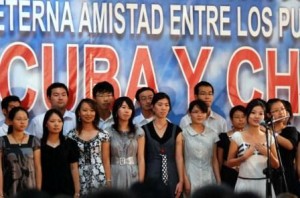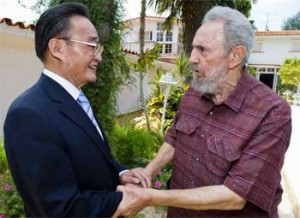Pedro Campos

Chinese President Hu Jintao during his visit to Cuba in 2008.
HAVANA TIMES ? Carlos Alberto Montaner, accused by official Cuban propagandists of being a CIA operative and a known advocate of liberalism, is in no way suspected of holding philosophically communist positions, and whose ideology I don?t share. Nonetheless, he generally uses factual data and information in his article ?A Chinese Tale with a Tragic Ending.? In it he says:
?Among the Chinese purchases is the company Putzmeister, founded in 1958, a German giant dedicated to construction equipment. It was acquired for billions of dollars in 2011 by SANY, a Chinese company founded in 1986 by three partners who at that time raised a small amount of capital equivalent to about $10,000 in current exchange rates.
?SANY president Lian Wengen is the richest man in China, with some calculating him to be worth $11 billion. With him being so rich and successful, what?s curious is that the Chinese Communist Party offered a seat on its Central Committee.
?The great Chinese success is not the triumph of a particular economic model, but the result of releasing the immense creative capacity of society in the field of private business. The Chinese state ceased being an obstacle to private business development and became its sponsor.?
SANY multiplied its capital 1,100,000 times in 25 years. But what no one can deny, though Montaner tries to hide it in the analytical part in his article, is that such accumulation has been achieved not so much by ?releasing the immense creative capacity of the society? but through the most horrendous and massive capitalist exploitation and commission of injustice in the past half century.
Marx was right: Capitalism came into the world dripping blood from every pore. If anyone ever doubted it, the Chinese have taken on the task of clearly displaying this in the 20th and 21st centuries.

Eternal Friendship: Cuba and China
This can be seen not only with the extreme exploitation to which the Chinese working class has been subjected in the last 25 years ? with twelve hour workdays, six days a week and for miserable wages ? but also with the repression of the millions of workers who have risen up against such abuses. They have been crushed by an authoritarian and militaristic regime in the name of ?socialism,? especially with the savage slaughter of thousands of young revolutionaries, democrats and communists in Tiananmen Square on June 4, 1989.
Capitalist growth there has reached such a point that China may soon be contending with the United States for first place in industrial production thanks to its savage capitalist accumulation. We have to realize that the ruling ?Communist Party? has denied Chinese workers the protection and rights earned by US workers over two centuries of struggle against capital, sacrificing these for the benefit of the domestic and foreign exploiters of the Chinese people. (1)
That, and nothing else, is the cause behind the ?Chinese miracle?
The architect of China?s reforms (punished during the life of Mao Zedong for being considered pro-capitalist) was Deng Xiaoping. He never stated officially and clearly that he intended to introduce private capitalism in China, but he used to say that the tools of the market economy (including the exploitation of wage labor) were neutral ? neither socialist nor capitalist.
?It doesn?t matter the color of the cat, as long as it catches mice,? he said pragmatically. The goal was to ?achieve development by increasing production,? while the means to achieving this was secondary.
Chinese reformers didn?t introduce capitalism ?boque-jarro? (in one fell swoop), as we say in Cuba.
At first Deng advocated a planned economy with market mechanisms, then he spoke of a mix between the planned economy and market mechanisms, later he talked about the socialist economy in the production of consumer goods, and finally he championed the ?socialist market economy,? a term that the Communist Party of China (CPC) continues to use.

Fidel Castro welcomes Chinese Parliamentary Leader Wu Bangguo. Photo: Alex Castro
All this was done little by little, gradually, masking the capitalist transition behind a ?Marxist? line that China was in the first stage of socialist construction, which admitted returning to private capitalism and the privatization of ?nationalized? enterprises.
With these word games, Deng and his associates succeeded in getting the CPC to adopt the position that for the establishment of socialism, it would have to abolish a tremendous counter-revolutionary manipulation of Marxist phraseology and dialectics. The CPC never made a thorough analysis of the ?state socialism? that had prevailed in China or its relations of production.
According to Deng, Mao?s earlier actions had been 70 percent correct and 30 percent in error, in the new leader?s attempt to give continuity to his plans and those of Maoism. Class struggle, one of the Maoists ?errors,? would have to cease.
This left open the door to pro-capitalist reforms and the alliances between the CPC and domestic and foreign capital ? ?without breaking? with the Maoist or ?Marxist? past.
Without pausing, slowly, with ?Chinese patience,? he was implementing private capitalist restoration. The first reform, in 1987, was to turn over land to private owners; the second was the creation of the SEZs (Special Economic Zones) to ensure pockets of capitalism that were provided with foreign investment (including from the Chinese diaspora) and finally the open privatization of state and communal enterprises, which was called the end of collectivization.
Deng?s initial economic reforms encouraged the expansion of discussions within the party and among the people. The dazibaos (murals) and opinion meetings returned. According to specialist Estella Pareja Morte (2), three trends coexisted within the CPC,: ?Those who didn?t want any kind of reform, those who wanted it controlled; and those who wanted more reforms, including in the political arena.?
Political reform off the table
With the death on April 15, 1989, of popular CPC leader Hu Yaobang, a supporter of political reform, demonstrations erupted in Beijing calling for democratic reforms and the stepping down of Deng Xiaoping from party leadership. This culminated in a mass rally in Tiananmen Square, where a large plaster replica of the Statue of Liberty was erected to the sound of the ?Internationale.?
Economic reforms were Ok, the questioning the supremacy of the party wasn?t ? political reforms were off the table. Therefore the response of the ?Communist Party? was to send Chinese troops and tanks in to crush the ?rebellion that demanded democratic reforms.? If these were allowed, it was argued, the chaos that reigned in the USSR could spill over into China. A pluralistic political system could divide the Chinese and the CPC, the ?guarantor of socialism? could lose power.
The barrels of the guns of the People?s Army silenced revolutionary demands and consolidated the positions of Deng and those close to him within the CPC.
When in 1992 the architect of capitalist reforms said ?getting rich is glorious,? he officially recognized capitalism as a major driver of China?s development.
Deng died in 1997, but ten years were enough for him to lay the foundations of his capitalist creation.
I?ll close with words of Chinese social scientists. (3)
?To abolish exploitation in the future, today we need to support exploitation,? said ?Marxism? professor Chen Zhan?an.
Historian Quin Hui stated: ?Marx was never against democracy, but he was always against the mechanisms of the market economy and economic liberalism. Today our Communist Party is accepting all elements of the market economy, but it strictly rejects democracy? As such, everything that is being done today is exactly the opposite of the principles of Marxism.?
Political scientist Kang Xiaoguang noted: ?If anything remains today of Mao, it?s Leninism; meaning that what remains is a Leninist political party retaining complete control through military force. The Chinese went from one extreme to another: they no longer have political ideals, they no longer have morality; they no longer believe in the principle of justice. Today the law that governs our society is the savage law of the jungle.?
?Mao would be broken-hearted. He would probably turn over in his grave if he saw how capitalism was developing in China. However Deng would be ecstatic,? summed up political scientist Zhang Wei Wei.
??
1 ? Walden Bello (born in the Philippines, 1945; founding director of Focus on the Global South), wrote:? ?To counter their declining profits, a sizable number of the Fortune 500 corporations have moved a significant part of their operations to China to take advantage of the so-called ?China Price? ? the cost advantage deriving from China?s seemingly inexhaustible cheap labor. By the middle of the first decade of the 21st century, roughly 40 to 50 per cent of the profits of US corporations were derived from their operations and sales abroad, especially China.? (October 8, 2008)
2- Las Reformas chinas. La voz de los intelectuales. Revista CIBOD, de Asuntos Internacionales No. 78
3-The quotes from these Chinese social scientists were taken from the documentary Good bye Mao, a French film production.
To contact Pedro Campos, write: perucho1949@yahoo.es
Share this post:
capybara duggars peter facinelli bobby rush supreme court justices 19 kids and counting danny o brien
No comments:
Post a Comment
Note: Only a member of this blog may post a comment.